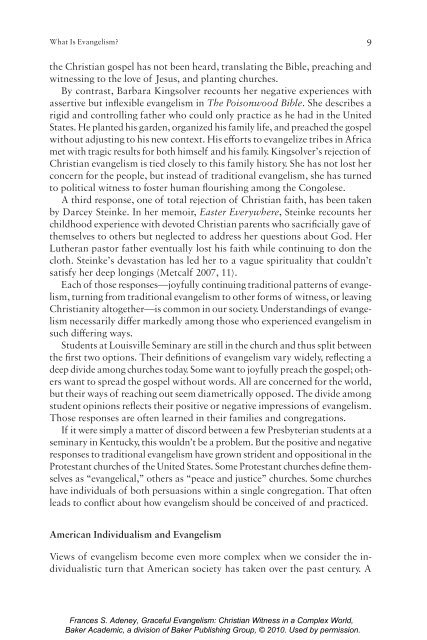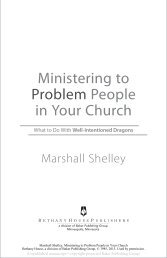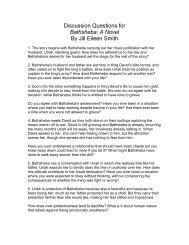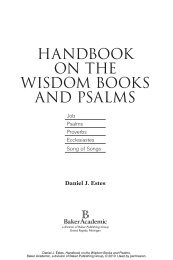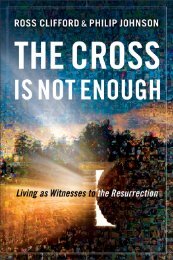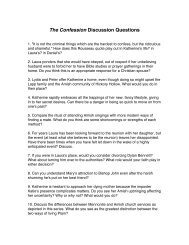Graceful EvanGElism - Baker Publishing Group
Graceful EvanGElism - Baker Publishing Group
Graceful EvanGElism - Baker Publishing Group
You also want an ePaper? Increase the reach of your titles
YUMPU automatically turns print PDFs into web optimized ePapers that Google loves.
What Is Evangelism?9the Christian gospel has not been heard, translating the Bible, preaching andwitnessing to the love of Jesus, and planting churches.By contrast, Barbara Kingsolver recounts her negative experiences withassertive but inflexible evangelism in The Poisonwood Bible. She describes arigid and controlling father who could only practice as he had in the UnitedStates. He planted his garden, organized his family life, and preached the gospelwithout adjusting to his new context. His efforts to evangelize tribes in Africamet with tragic results for both himself and his family. Kingsolver’s rejection ofChristian evangelism is tied closely to this family history. She has not lost herconcern for the people, but instead of traditional evangelism, she has turnedto political witness to foster human flourishing among the Congolese.A third response, one of total rejection of Christian faith, has been takenby Darcey Steinke. In her memoir, Easter Everywhere, Steinke recounts herchildhood experience with devoted Christian parents who sacrificially gave ofthemselves to others but neglected to address her questions about God. HerLutheran pastor father eventually lost his faith while continuing to don thecloth. Steinke’s devastation has led her to a vague spirituality that couldn’tsatisfy her deep longings (Metcalf 2007, 11).Each of those responses—joyfully continuing traditional patterns of evangelism,turning from traditional evangelism to other forms of witness, or leavingChristianity altogether—is common in our society. Understandings of evangelismnecessarily differ markedly among those who experienced evangelism insuch differing ways.Students at Louisville Seminary are still in the church and thus split betweenthe first two options. Their definitions of evangelism vary widely, reflecting adeep divide among churches today. Some want to joyfully preach the gospel; otherswant to spread the gospel without words. All are concerned for the world,but their ways of reaching out seem diametrically opposed. The divide amongstudent opinions reflects their positive or negative impressions of evangelism.Those responses are often learned in their families and congregations.If it were simply a matter of discord between a few Presbyterian students at aseminary in Kentucky, this wouldn’t be a problem. But the positive and negativeresponses to traditional evangelism have grown strident and oppositional in theProtestant churches of the United States. Some Protestant churches define themselvesas “evangelical,” others as “peace and justice” churches. Some churcheshave individuals of both persuasions within a single congregation. That oftenleads to conflict about how evangelism should be conceived of and practiced.American Individualism and EvangelismViews of evangelism become even more complex when we consider the individualisticturn that American society has taken over the past century. AFrances S. Adeney, <strong>Graceful</strong> Evangelism: Christian Witness in a Complex World,<strong>Baker</strong> Academic, a division of <strong>Baker</strong> <strong>Publishing</strong> <strong>Group</strong>, © 2010. Used by permission.


